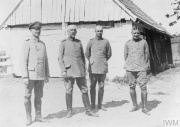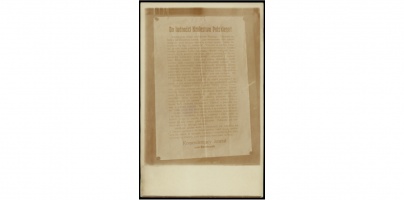Career↑
Stemming from a Baltic family background, Friedrich von Bernhardi (1849-1930) was born in Saint Petersburg as son of a Prussian diplomat and historian and the daughter of a Russian admiral. The family later moved to Lower Silesia. In 1869, Bernhardi joined the 14th Hussar Regiment in Kassel and fought with the unit in the Franco-Prussian War of 1870/1871. His subsequent career saw various troop commands in the cavalry, a tour as military attaché in Switzerland (1891-1894), a rather brief period as head of the general staff’s military history section (1899-1901), and a final posting as Commanding General of the VII Corps in Münster. In 1909, Bernhardi resigned as General der Kavallerie and became a professional military writer. During these years, he published “Reiterdienst” (1909), “Vom heutigen Kriege“ (1912), and “Deutschland und der nächste Krieg” (1912).
In August 1914, Bernhardi was reactivated as a territorial commander. He then took command of the 49th Reserve Division in September 1915, followed by the 55th Corps (Generalkommando z. b. V. 55) in October 1916 in Galicia and the Ukraine, respectively. In early 1918, his staff was moved to Flanders where Bernhardi participated in the German spring offensive. He was decommissioned in 1918. Given his age and his reputation as a penman, Bernhardi proved an unspectacular yet resilient commander. He received the Prussian order Pour le mérite with oak leaves.
Military writings↑
Bernhardi’s comprehensive oeuvre circles around four major topics: history of the campaigns of Friedrich II, King of Prussia (1744-1797); organization and tactics of modern cavalry; the character of contemporary war; and Bernhardi’s political demand for an aggressive war for global domination. The latter aspect – brought forward in his early anonymous pamphlet “Videant consules” (1890), and later notoriously elaborated in “Deutschland und der nächste Krieg” – determined his legacy.
But Bernhardi also played a central role in the long-lasting historical debate with the historian Hans Delbrück (1848-1929) on the wars of Friedrich II (Strategiestreit) and a vendetta against the military writer Fritz Hoenig (1848-1902). Bernhardi’s memoirs count among the more profound and reflexive testimonials of the conservative Prussian military elite.
Impact↑
Friedrich von Bernhardi’s career started as a cavalry officer and an official historian of the Prussian general staff. Following his temporary resignation from the army, he developed into the archetype of a new literature and politics: a fin de siècle figure, a military writer with a strong political agenda. His stance would bring him in discrepancy not only with critical academics like Hans Delbrück but also with military opinion leaders like Alfred von Schlieffen (1833-1913). In this role Bernhardi stands solitary in Imperial Germany. His impact as an apostle of war on the officer corps and public opinion in Germany (and beyond) is contested to this day.
Markus Pöhlmann, Zentrum für Militärgeschichte und Sozialwissenschaften der Bundeswehr
Section Editor: Mark Jones
Selected Bibliography
- Holmes, Terence M.: Der Schlieffenplan des Friedrich von Bernhardi. Zur Beilegung eines mythischen Streitfalls, in: Militärgeschichtliche Zeitschrift 63/2, 2004, pp. 429-444.
- Krumeich, Gerd: Friedrich von Bernhardi – Théoricien militaire marginal ou représentatif? Réflexions sur l’influence de 'Deutschland und der nächste Krieg' (1912), in: Francia 40, 2013, pp. 355-362.
- Nehring, Walter K.: General der Kavallerie Friedrich von Bernhardi – Soldat und Militärwissenschaftler, in: Bradley, Dermot / Marwedel, Ulrich (eds.): Militärgeschichte, Militärwissenschaft und Konfliktforschung. Eine Festschrift für Werner Hahlweg zur Vollendung seines 65. Lebensjahres am 29. April 1977, Osnabrück 1977: Biblio Verlag, pp. 295-308.
- Pöhlmann, Markus: Das unentdeckte Land. Kriegsbild und Zukunftskrieg in deutschen Militärzeitschriften, in: Förster, Stig (ed.): Vor dem Sprung ins Dunkle. Die militärische Debatte über den Krieg der Zukunft 1880-1914, Paderborn 2016: Ferdinand Schöninch, pp. 21-131.
- Raschke, Martin: Der politisierende Generalstab. Die friderizianischen Kriege in der amtlichen deutschen Militärgeschichtsschreibung, 1890-1914, Freiburg 1993: Rombach.









